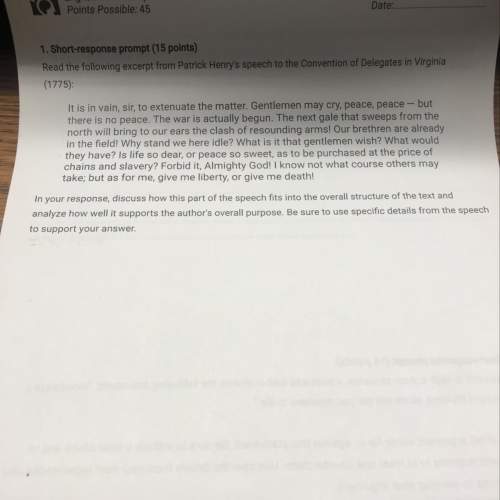What is empathic listening?
a) listening for facts and supporting details
b) imagining...

English, 31.08.2019 01:00 kristinbohannan
What is empathic listening?
a) listening for facts and supporting details
b) imagining yourself in the speaker’s position
c) asking questions to obtain more information
d) identifying artistic elements in a speech

Answers: 2


Other questions on the subject: English

English, 21.06.2019 16:00, eldercunningham
Why is emerson’s essay “self-reliance” a great example of transcendentalism?
Answers: 2

English, 21.06.2019 17:00, okitsfrizz2370
Click to read the passage from "lifeboat ethics," by garrett hardin. then answer the question. what is the author's purpose for including the following example in his argument against rich nations poor nations? a. he wants to explain why more nations need to invest in "miracle" crops. b. he wants to disprove the idea that poor nations will eventually be able to support themselves. c. he wants to prove that the green revolution is the best use of people's money. d. he wants to show a solution to poverty that he believes can actually work.
Answers: 1


English, 21.06.2019 23:00, sarn8899
An expository essay instructs, provides information, or explains. in this essay, you are presenting information and explaining why you think the ideas and work of the individual you chose had an effect on european thought. but before you begin writing the essay, you need to organize the information you’ve gathered by creating an outline. directions: your taking notes sheet should have you identify and organize the information you found while doing your research. now it is time to create an outline to organize the information in the way you will present it in your essay. you may decide not to use all the information you gathered, but be sure you do not leave out anything that you believe is important to support your thesis. your essay should include an introductory paragraph, supporting paragraphs, and a concluding paragraph. each paragraph should cover one main topic and should correspond to a roman numeral (i., ii., iii.) on the outline. the main topics should cover: the person’s accomplishment and contributions, and the effect of his or her accomplishments or contributions on european thought. write a topic sentence for each paragraph of your essay. be sure it tells the reader what the section will be about and how the information relates to your thesis statement. your topic sentence for the introductory paragraph might say something like “johannes gutenberg’s invention changed the way people communicated.” a topic sentence for the second paragraph—the first main topic—might be something like "gutenberg’s printing press changed the way books were produced and the way knowledge was communicated.” decide which pieces of information you will use to support your topic sentences. (these ideas or groups of facts are called subtopics.) subtopics follow capital letters and periods (a., b., and c.) on your outline. add this information beneath your topic sentence. you can further divide subtopics into specific facts. in an outline, specific facts follow arabic numerals and periods (1. 2. 3. 4.) end your outline and essay with a concluding paragraph. write a concluding paragraph that summarizes the main ideas of your essay and restates your thesis statement in some way. write no more than four or five sentences. worth 241 points
Answers: 1
You know the right answer?
Questions in other subjects:

Computers and Technology, 05.02.2021 06:20

History, 05.02.2021 06:20


Physics, 05.02.2021 06:20




Mathematics, 05.02.2021 06:20

Mathematics, 05.02.2021 06:20

Mathematics, 05.02.2021 06:20




